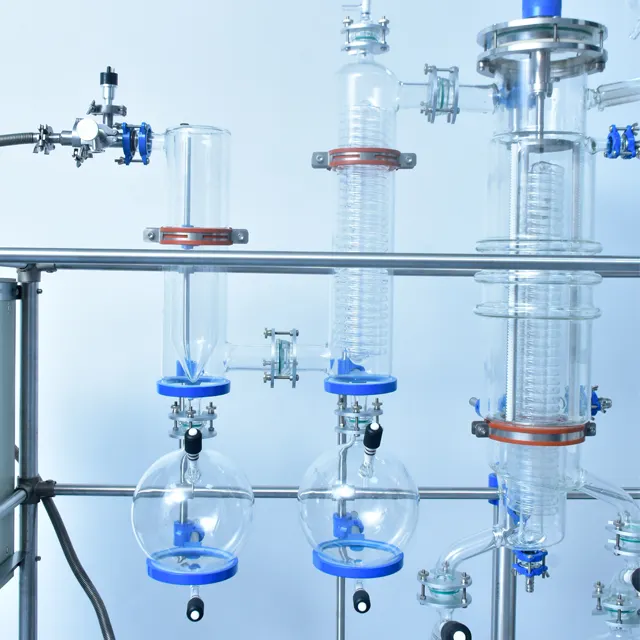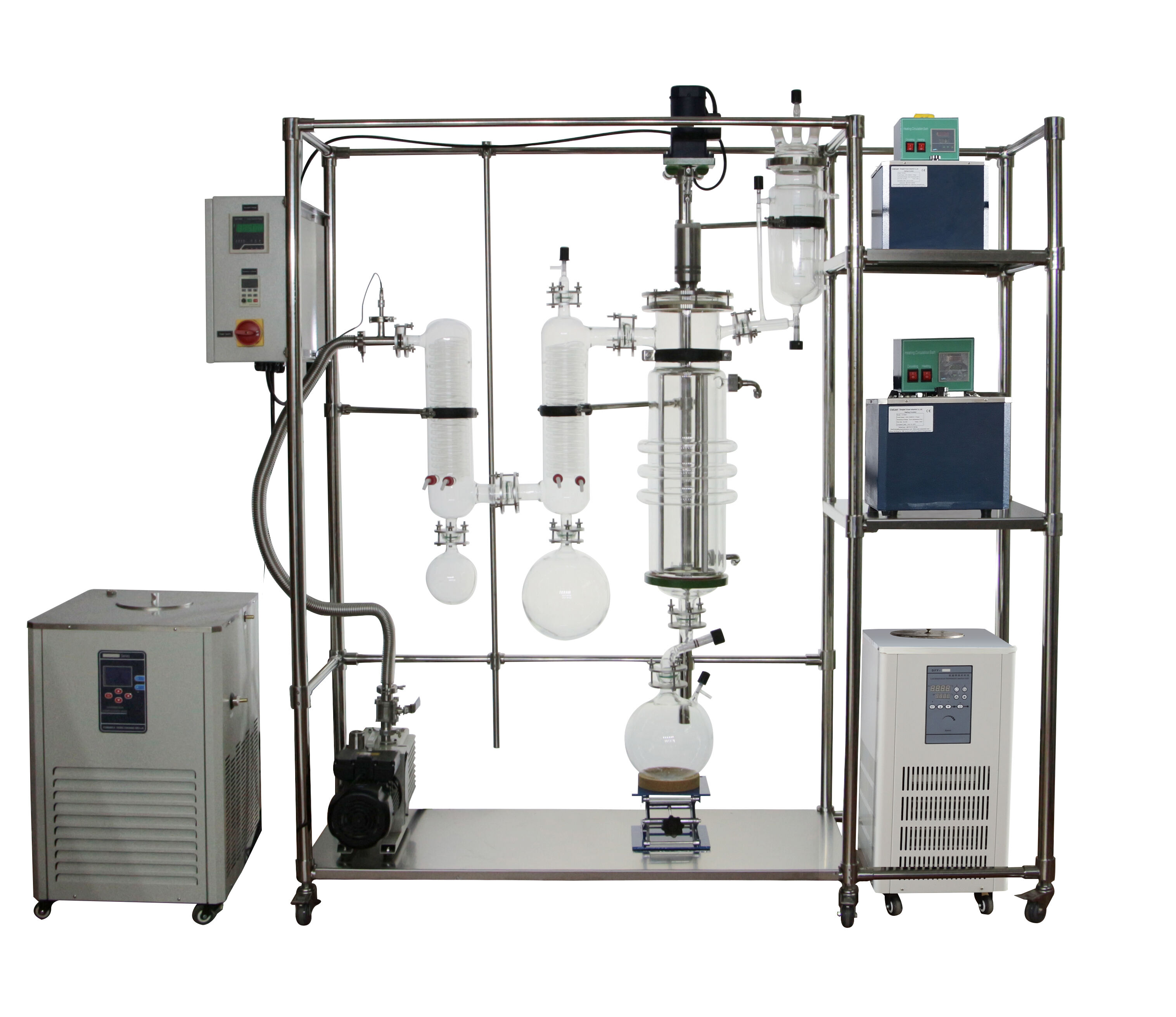The Role of Glass in Molecular Distillation Systems
Core Components of Glass Molecular Distillation Systems
Distillation Columns in Glass Molecular Distillation System There are two main components in molecular distillation systems: distillation column and a condenser. These high quality, heat resistant glass columns will stand up to examination and observation (in use) and help you keep an eye on what you're doing while you're doing it. The inclusion of glass receiving flasks is also necessary. Not only do these flasks keep the purity of the distillates, they also allow a clear view of the process for quality control, consistency of the distilled product and prevent product contamination. In addition, glass stillheads are critical to the purification process by providing a method for the efficient separation of fractions during distillation. This guarantees that the final results are extremely pure, an extremely important consideration for pharmaceutical and biotech companies. These glass elements together are responsible for the high efficiency & reliability of the Glass Molecular Distillation Systems.
Advantages Over Traditional Metal-Based Systems
The Glass Molecular Distillation Systems provides many refining advantages over conventional metal systems. One of the major benefits is the increased visibility it gives the user to see the distillation as it is happening, this is important for making quick adjustments and providing the best results possible. This increased visibility is important for working with materials that are sensitive or valuable. And in addition, the glass systems are also less prone to contamination compared with the metal systems as a result of its corrosion resistance. Metal systems oxidize, especially under the influence of corrosive substances after passage of time, which can leach undesirable byproducts into the distillate. Finally, glass systems have a better thermal management. This leads to a better heat division control, where the latter is of crucial importance in keeping the precision in such molecular distillation processes. Therefore, efficient cooling of glass systems has a substantial effect on their performance and power consumption.
Precision Temperature Control with Glass Molecular Distillation
Thermal Stability of Borosilicate Glass
Borosilcate glass is well known for its compact texture strong mechanical strength and strong impact resistance and ability to withstand thermal shock and is particularly convenient for molecular distillation use. It resists a sudden change of temperature so that no cracking occurs thus allowing distillation to continue. A major characteristic of borosilicate glass is its very low coefficient of thermal expansion, about one-third that of ordinary glass. This feature integrity is critical during distillation, which is regulated by accurate temperature control and cannot be compromised. The thermal resistance of borosilicate glass makes the glass an ideal material in a laboratory, where it can be used for for chemical and thermal stress involved in distillation as well as processing.
Low-Temperature Operation for Sensitive Compounds
Glass molecular distillation units are characterized by its low working temperature, allowing the separation of high boiling temperature products, especially for thermally sensitive material. This provision is particularly critical in pharmaceuticals and fine chemicals processing where overheating will result in product degradation. Distill at substantially reduced temperatures, where cooler operation means less energy used, and no water is wasted by evaporation. This feature ensures that the product has high quality as well as high operation stability and safety. As such, glass systems are preferred for their flexibility in handling sensitive materials, in order to purify without denaturing.
Chemical Inertness: Maintaining Purity in Critical Processes
Non-Reactive Surfaces for Pharmaceutical-Grade Output
In pharmacological applications, this is important to maintain the purity of the product. Glass is chemically impermeable to the solvents and thus provides a high degree of purity in the distillation process. This is an important feature in pharmaceutical uses, where purity is essential and compliance with industry standards is not an option. Non-reactive glass surfaces ensure that potential chemical reactions, which may compromise the product vented or become contaminated with the product, will not occur, thereby ensuring the drugs are safe and effective.
Eliminating Metal Contamination Risks
WGMD glass wiped film molecular distillation equipment delivers an effective separation process, reducing the risk of metal ion contamination even in small scale operation, and easily scale up to HiPco commercial production. Metal interactions may be a huge obstacle particularly in the manufacture of APIs, where metallic leaching in trace can affect product quality. Appreciate a removable arm assembly with stainless steel connection, but why consider anything but glass for the core of what you are feeding your plants? With glass-based systems, the chances of any leaching are virtually non-existent and an environment safe enough for the strictest quality control is guaranteed. This also helps to prevent possible problems caused by the leaching out of metal, preserving the integrity and purity of the product as the distillation process proceeds.
Real-Time Process Monitoring Through Transparent Design
Visual Optimization of Thin Film Formation
One important aspect of glass transparent in molecular distillation systems is its visualization, especially in the view of thin film itself. This option makes it possible for operators to promptly correct, distillation parameters to maintain the process conditions into the desired operational envelope. Through visual inspection, film behavior can be easily checked to avoid waste and improve quality. Especially when achieving high precision during the distillation process is desired, in order to ensure constant product quality in challenging industrial applications Maintaining visual control throughout distillation cycle is of high importance.
Instant Identification of Process Anomalies
Glass construction for distillation plant is important in quickly detecting process problems. Such visible nature enables detection of anomalies, which otherwise can result in long downtime and contaminants. The methods provide for expedite responses, and can increase the overall safety and expediency of distillation processes. Through supporting and continuing to help enforce strict quality requirements, the clear nature of glass guarantees that the entire distillation process is in keeping with industry regulations and standards.
Uniform Heat Distribution in Glass-Based Systems
Eliminating Hotspots for Consistent Product Quality
Uniform heat distribution, which depends on the material of construction (viz. clear glass), is essential for distillation systems using glass components. This is crucial in avoiding hot spots that can put product quality at risk. Unlike metals, glass offers a uniform distribution of temperature resulting in the even vaporization rates over the entirety of the system. When heat is distributed evenly, a more consistent control over distillation can be achieved which maintains the quality of each and every batch. In addition, such uniformity serves to maximize thin film formation, which is critical to realizing the highest possible yield in the process.
Impact on Distillation Efficiency and Yield
ADVANTAGES One of the keys to increase the efficiency and production of the distillation is temperature control. Since the loss of active compounds is prevented by constant temperature, glass systems have the advantage of not wasting valuable substances. So not only is it more pocket friendly, it also offers better yield rates, a huge advantage when optimising large scale industrial functionality. If the temperature is properly controlled, good fractionation occurs and the wastage of components, etc. is thereby reduced and the efficiency of the distillation cycle is simultaneously increased. Thus, these systems are critical for processes focused on achieving high throughput at low energy consumption and reduced material loss.

Industrial Applications of Glass Molecular Distillation
Pharmaceutical Intermediate Purification
The pharmaceutical industry in particular depends on glass distillation apparatuses for the purification of intermediates. These systems allow manufacturers of all sizes to adhere to strict pharmaceutical standards for purity and safety. The use of glass in such systems is advantageous to allow the intermediates to be refined to very high purities, which is important to the effectiveness of the ultimately produced pharmaceuticals. This purification is essential to achieve the required quality and performance levels expected in the industry.
Essential Oil Refinement
Essential oils being distilled in glass molecular distillation systems will have dramatically improved quality. The aromatic and healing qualities of the oils are well retained by these glass systems, which are much sought after in the personal care and therapeutic products markets. With the rise in consumer preference for natural, glass distillation is gaining traction to ensure the purity and efficacy of essential oils. This ensures production of aroma molecules that satisfy market demands for genuineness and intensity.
High-Purity Cannabinoid Isolation
Cannabinoid Pure glass molecular distillation is essential for the cannabis industry. By nature, glass systems are designed to maintain the highest levels of purity that are required for medicinal applications where controlled accuracy and dependability are of utmost importance. As the medicinal cannabis industry blossoms, even greater premium is placed upon purity and quality, which is why so many producers are turning to ABI's glass distillation systems. The incorporation of glass systems in such applications is testament to increasing industry commitment to producing products of the highest quality.
FAQs
What are Glass Molecular Distillation Systems?
Glass Molecular Distillation Systems are specialized setups using glass components to facilitate the distillation process, offering advantages like enhanced visibility, lower contamination risks, and better thermal management.
Why is borosilicate glass preferred in distillation systems?
Borosilicate glass is favored due to its exceptional thermal stability and low chemical reactivity, making it ideal for processes demanding precise temperature control and purity maintenance.
How do glass systems reduce contamination risks?
Glass systems reduce contamination risks by eliminating metal interactions and leaching, thus ensuring a contaminant-free environment and preserving product integrity.
What are the industrial applications of glass distillation systems?
Glass distillation systems are used in pharmaceutical intermediate purification, essential oil refinement, and high-purity cannabinoid isolation, among other applications.
Table of Contents
- The Role of Glass in Molecular Distillation Systems
- Precision Temperature Control with Glass Molecular Distillation
- Chemical Inertness: Maintaining Purity in Critical Processes
- Real-Time Process Monitoring Through Transparent Design
- Uniform Heat Distribution in Glass-Based Systems
- Industrial Applications of Glass Molecular Distillation
- FAQs

